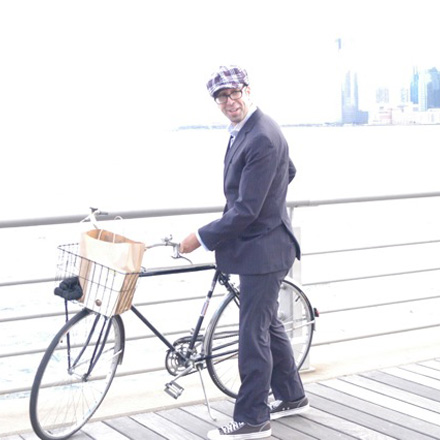 Tweet
Tweet
Featured on Feb 15, 2011
Abe Safdie
"There are some days that catch the light, days like diamonds."
Bio:
Born, schooled and stickballed in Brooklyn, but the clearly uncool part of it. A Sat Night Fever mentality quickly comes over me upon returning. For eight years, I climbed the corporate law ladder at one of the big NYC firms, gaining high level experience in mergers & acquisitions, public offerings and venture capital financings. As a way to nourish my teaching bent, I created a solo legal practice a year ago dedicated to counseling start-up companies and educating founders on corporate and general commercial legal issues. It's been an extremely rewarding experience enabling my clients realize their visions. Along the way, I helped found a synagogue for Syrian and Egyptian Jews; and I remain stubbornly convinced that there is a solution to peace in the Middle East. Perhaps if all parties involved just drank copious amounts of arak. Without holding uzis.
- Title: Corporate Attorney at The Law Office of Abraham J Safdie PLLC
- Age: 37
- Location: SoHo
- Contact: safdiepllc.com
Why did you choose to help startup companies and founders when you created your solo legal practice?
At Kramer Levin, the firm I worked at for a number of years, my job generally consisted of negotiating deals whose primary real world effects were a few ticks in a stock price and a different multinational signing someone's pay check. The deals were sophisticated and there was a rush of adrenalin, but the effects at the real world were too attenuated to make the work meaningful in a significant way.
While I was there, I was fortunate enough to help start a pro bono program advising start-up companies. As the caretaker/midwife for ideas that founders had been nurturing over a significant time, the start-up work had a more significant feel. Also, my clients were often up against more savvy investors, greedy counter-parties or opaque government rules. As an attorney with big firm experience, I could correct a power imbalance, while satisfying an education bone that I'd been carrying around. Advising start-ups was infinitely more rewarding. I view my existing practice as a continuation of this work.
Where the is synagogue that you helped to found and how did you get involved in doing that?
Within an Arab milieu, religion and religious observance have always been part of the social and cultural fabric of life. As a Syrian Jew, my religious outlook was similarly pervasive. When I moved into the Union Square area of Manhattan ten years ago and discovered that an informal prayer group for Middle Eastern Jews had been formed, it was natural for me to get involved. Along with a group of other young professionals, we helped incorporate the synagogue, renovate the space and now host a full range of religious, cultural, social and educational events.
I feel the need to continue to support this endeavor as I witness the particular humanist voice of Middle Eastern Jews progressively drowned out in favor of immature fundamentalisms. Also, the existence of a Jewish Arabic culture challenges the all-too-easily accepted notion of a natural enmity between the peoples. It's with a mixture of pride and sadness when I say that I believe this synagogue remains one of the last truly open-minded, yet completely traditional, Jewish institutions in New York.
Why did you become a lawyer?
A Talmudic penchant for justice and argumentation.
What are your thoughts on the impact of technologies like Twitter and Facebook on the Middle East and the prospect for peace there?
It's pretty incredible to see what's happening in the Middle East these days. Without a constant stream of updates from Egypt, Mubarak would certainly not have been as inclined to step down while shedding as few drops of blood. When it comes to allowing dissident forces to coalesce, social networking sites are proving themselves invaluable.
The Israeli-Palestinian situation is slightly different than an autocrat scenario, but social networking can galvanize peace-seeking Palestinians and Israelis to organize within their own communities and to directly open a dialogue with their counterparts; completely bypassing the often frustrating political process. There are websites supporting these activities; I'm frankly surprised that their impact hasn't been felt greater.
In the end, I think Israeli-Palestinian peace will primarily come down to in-person interactions and economic interdependency between the peoples. It's hard to threaten someone with an uzi when you know your wife is going to send you to his store later in the day to pick up some milk and eggs.
You mention arak in your bio. Is that your favorite drink? If not, what is your drink of choice?
I'm more of a scotch guy myself. Talisker? Lagavulin? I'm there.